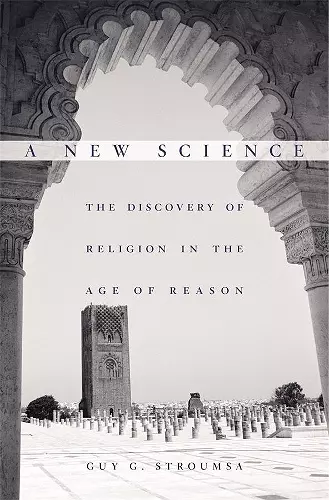A New Science
The Discovery of Religion in the Age of Reason
Format:Hardback
Publisher:Harvard University Press
Published:15th Jul '10
Currently unavailable, and unfortunately no date known when it will be back

An erudite and enormously informative work. This book will be a useful guide to the hitherto neglected area of the earlier history of European religious discourse. It also can be an enjoyable reading in its own right for those with an appetite for a rich historical overview. -- Tomoko Masuzawa, University of Michigan The strongest and most passionate argument that I have read for the progressive development of a science of religion out of the conflicted and creative history of early modern Europe. Stroumsa makes a powerful case, one with which historians of early modern religion will have to grapple in sustained and thoughtful ways. It will be a landmark in its field. -- Jonathan Sheehan, University of California, Berkeley Reconsidering the origin myth for the study of religion, Stroumsa moves us back from the 19th to the 17th century and identifies crucial factors that made such an enterprise possible -- the Catholic missionary enterprise in the New World and elsewhere; Protestant practices of textual criticism; and above all the continuing aftershocks of the wars of religion. This is a book marked by warmth and generosity of spirit, as well as formidable learning. -- Bruce Lincoln, University of Chicago
We see the word 'religion' everywhere, yet do we understand what it means, and is there a consistent worldwide understanding? Who discovered religion and in what context? This title offers an argument that the comparative study of religion finds its origin in early modern Europe.We see the word “religion” everywhere, yet do we understand what it means, and is there a consistent worldwide understanding? Who discovered religion and in what context? In A New Science, Guy Stroumsa offers an innovative and powerful argument that the comparative study of religion finds its origin in early modern Europe. The world in which this new category emerged was marked by three major historical and intellectual phenomena: the rise of European empires, that gave birth to ethnological curiosity; the Reformation, which permanently altered Christianity; and the invention of philology, a discipline that transformed Western intellectual thought. Against this complex historical backdrop, Stroumsa guides us through the lives and writings of the men who came to define the word “religion.” As Stroumsa boldly argues, the modern study of religion, a new science, was made possible through a dialectical process between Catholic and Protestant scholars. Ancient Israelite religion, Judaism, Christianity, Islam, Manichaeanism, Zoroastrianism, the sacred beliefs of the New World, and those of Greece, Rome, India, and China, composed the complex ground upon which “religion,” a most modern category, was discovered.
An erudite and enormously informative work. This book will be a useful guide to the hitherto neglected area of the earlier history of European religious discourse. It also can be an enjoyable reading in its own right for those with an appetite for a rich historical overview. -- Tomoko Masuzawa, University of Michigan
The strongest and most passionate argument that I have read for the progressive development of a science of religion out of the conflicted and creative history of early modern Europe. Stroumsa makes a powerful case, one with which historians of early modern religion will have to grapple in sustained and thoughtful ways. It will be a landmark in its field. -- Jonathan Sheehan, University of California, Berkeley
Reconsidering the origin myth for the study of religion, Stroumsa moves us back from the 19th to the 17th century and identifies crucial factors that made such an enterprise possible -- the Catholic missionary enterprise in the New World and elsewhere; Protestant practices of textual criticism; and above all the continuing aftershocks of the wars of religion. This is a book marked by warmth and generosity of spirit, as well as formidable learning. -- Bruce Lincoln, University of Chicago
[Stroumsa] contends, persuasively and readably, that our current comparative approach to religious phenomena has three main historical roots... Stroumsa maps their relationship with elegance, insight, and a splendid intolerance of cant. This is a major new landmark in the intellectual landscape. It will help us to keep our bearings as we navigate around our own feelings toward religion and religions. -- Charles Foster * Fortean Times *
- Nominated for Distinguished Book Award - Sociology of Religion 2011
- Nominated for Award for Excellence in the Study of Religion 2011
- Nominated for George L. Mosse Prize 2011
ISBN: 9780674048607
Dimensions: unknown
Weight: unknown
240 pages